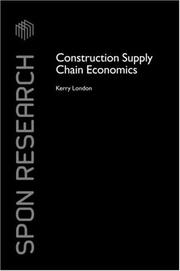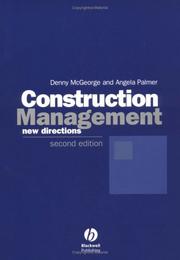| Listing 1 - 5 of 5 |
Sort by
|

ISBN: 1134130317 1281064335 9786611064334 0203962486 0415409713 1138861324 1134130309 Year: 2007 Publisher: London : Taylor & Francis,
Abstract | Keywords | Export | Availability | Bookmark
 Loading...
Loading...Choose an application
- Reference Manager
- EndNote
- RefWorks (Direct export to RefWorks)
This is the first comprehensive investigation of the industrial sourcing and procurement practices throughout sixty-eight construction industry supply channels across seven major commodity sectors at all levels. London presents real-world case studies to combine theory and practice to describe the economic structural and behavioural characteristics of sectors integral to the construction industry performance. Construction Supply Chain Economics details 'everyday' experiences and procurement decisions made by people in firms in the industry related to projects as they seek out other
Construction industry --- Business logistics. --- Economic aspects. --- Supply chain management --- Industrial management --- Logistics --- Building industry --- Home building industry --- Building
Book
Year: 2007 Publisher: London ; New York : Taylor & Francis,
Abstract | Keywords | Export | Availability | Bookmark
 Loading...
Loading...Choose an application
- Reference Manager
- EndNote
- RefWorks (Direct export to RefWorks)
This is the first comprehensive investigation of the industrial sourcing and procurement practices throughout sixty-eight construction industry supply channels across seven major commodity sectors at all levels. London presents real-world case studies to combine theory and practice to describe the economic structural and behavioural characteristics of sectors integral to the construction industry performance. Construction Supply Chain Economics details 'everyday' experiences and procurement decisions made by people in firms in the industry related to projects as they seek out other firms to work with during the tendering stage. London creates a language that enables us to classify and understand behaviour and recognise the impact of our decisions on firms and projects within the industry. Construction Supply Chain Economics introduces a new model for mapping the construction sector of particular interest to construction management and economic researchers and to procurement decision makers, including policymakers and clients, as well as industry practitioners, such as contractors, consultants and materials suppliers.
Book
Year: 2007 Publisher: London ; New York : Taylor & Francis,
Abstract | Keywords | Export | Availability | Bookmark
 Loading...
Loading...Choose an application
- Reference Manager
- EndNote
- RefWorks (Direct export to RefWorks)
This is the first comprehensive investigation of the industrial sourcing and procurement practices throughout sixty-eight construction industry supply channels across seven major commodity sectors at all levels. London presents real-world case studies to combine theory and practice to describe the economic structural and behavioural characteristics of sectors integral to the construction industry performance. Construction Supply Chain Economics details 'everyday' experiences and procurement decisions made by people in firms in the industry related to projects as they seek out other firms to work with during the tendering stage. London creates a language that enables us to classify and understand behaviour and recognise the impact of our decisions on firms and projects within the industry. Construction Supply Chain Economics introduces a new model for mapping the construction sector of particular interest to construction management and economic researchers and to procurement decision makers, including policymakers and clients, as well as industry practitioners, such as contractors, consultants and materials suppliers.
Book
Year: 2007 Publisher: London ; New York : Taylor & Francis,
Abstract | Keywords | Export | Availability | Bookmark
 Loading...
Loading...Choose an application
- Reference Manager
- EndNote
- RefWorks (Direct export to RefWorks)
This is the first comprehensive investigation of the industrial sourcing and procurement practices throughout sixty-eight construction industry supply channels across seven major commodity sectors at all levels. London presents real-world case studies to combine theory and practice to describe the economic structural and behavioural characteristics of sectors integral to the construction industry performance. Construction Supply Chain Economics details 'everyday' experiences and procurement decisions made by people in firms in the industry related to projects as they seek out other firms to work with during the tendering stage. London creates a language that enables us to classify and understand behaviour and recognise the impact of our decisions on firms and projects within the industry. Construction Supply Chain Economics introduces a new model for mapping the construction sector of particular interest to construction management and economic researchers and to procurement decision makers, including policymakers and clients, as well as industry practitioners, such as contractors, consultants and materials suppliers.

ISBN: 0632060425 Year: 2002 Publisher: Oxford Blackwell Science
Abstract | Keywords | Export | Availability | Bookmark
 Loading...
Loading...Choose an application
- Reference Manager
- EndNote
- RefWorks (Direct export to RefWorks)
| Listing 1 - 5 of 5 |
Sort by
|

 Search
Search Feedback
Feedback About UniCat
About UniCat  Help
Help News
News